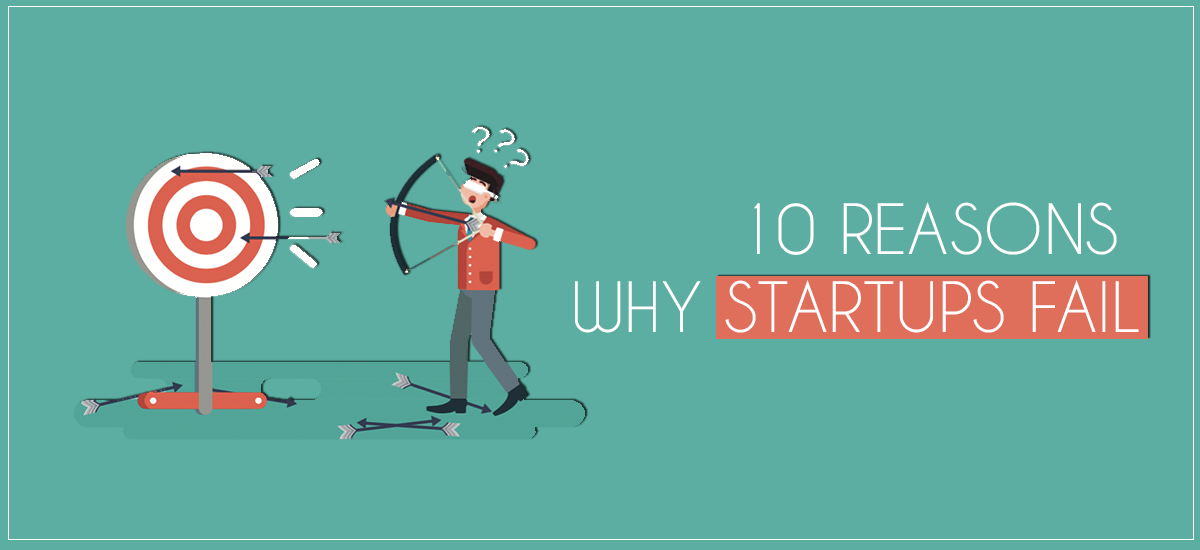10 REASONS WHY STARTUPS FAIL

- July 10, 2018
- Business Consultation , Digital Marketing
We look after for the startups fail into similar patterns surrounding a lack of product/market fit, the wrong team, the lack of the plan of actions, or a host of different factors that show the startup’s possible disappointment. In the wake of evaluating thousands of startups in view of their product, team, and traction, we’ve accepted this open door to experience the top ten reasons why startups come up short (startups in this CB Insights research examine cited in excess of one factor for their disappointment). Through this, you’ll have the capacity to navigate these uneven waters and be prepared to deal with similar challenges that come to your direction.
STARTUPS FAIL
1. Lack of market need (42%): Tremendously the main purpose startups leave a business, 42% of startups renowned that a lack of market demand kept them from picking up the power they expected to survive. When contemplating your own particular product, think about this: would you say you are genuinely unraveling a widespread pain point and do individuals truly require what you’re putting forth? Is your product a vitamin, something that is “nice to have,” or is it a painkiller, “a critical need”?
2. Lack of money (29%): Many startups keep running into issues when they have inadequate assets to cover their tasks, resulting in a short runway. A similarly inverse situation is additionally conceivable, where a startup gets too much financing and misallocates the money or spends it too rapidly.
3. Wrong team (23%): Having a durable gathering of profoundly energetic, steady, and differently talented individuals is pivotal for startup achievement since 23% of startups cited a lacking team as a contributing factor to their disappointment. It’s essential that the team be joined around a typical vision and has settled upon the startup’s long-haul objectives, with the goal that everybody remains on an indistinguishable page from the startup develops.
4. Too much competition (19%): When you manufacture a superior product than existing contributions, it’s presumable that vast organizations or new startups will enter the space and wear down your market share. In spite of the fact that having this first-mover advantage can be extremely useful, a second-mover advantage enables new competitors to rapidly catch market share in a market that you helped validate.
5. Evaluating issues (18%): Figuring out how to cost is dependably a test, however for 18% of startups, it was a reason they fizzled. For startups, it is a consistent trading off act between estimating sufficiently high to keep up solid edges and take care of working expenses, while additionally expecting to value sufficiently low to allure customers.
6. Poor product (17%): For a wide assortment of reasons, founders at times discharge products that don’t completely speak to customers, which was the situation for 17% of startups that close down in view of a client un-accommodating product. Accordingly, it’s basic that founders completely comprehend their objective purchaser, the issue or pain point they’re attempting to illuminate, and how their product takes care of the issue.
7. Plan of action (17%): Lacking an adaptation technique, just concentrating on single channel, neglecting to discover approaches to scale, and different plan of action issues brought about the disappointment of 17% all things considered. Without a sound plan of action, VCs are probably going to address on the off chance that they will ever observe an arrival on their speculation, regardless of whether the startup has an extraordinary product or traction.
8. Weak marketing (14%): Many founders are energetic professors in the product they are building, just to overlook that if the intended interest group doesn’t know about the product’s presence, the organization won’t succeed. On account of 14% of startups, a lack of marketing, or not seeing sufficiently quick how to get one’s product under the control of the objective market, brought about the startup’s ruin.
9. Not customer-driven (14%): Bill Gates is known to have said that “your most miserable customers are your most prominent wellspring of adapting,” however sadly, numerous startups neglect to obtain customer feedback and follow up on it. Rather than always testing, tweaking, and adjusting the product to fit their customers’ needs, a few founders fall into the trap of building a product for themselves, not the client.
10. Poor planning (13%): In his renowned TED Talk, Bill Gross, the organizer of Idealab (an incubator that has hosted more than 100 organizations), distinguished the five principal factors that he accepted were fundamental for startup achievement. Utilizing several contextual analyses, he presumed that planning was the main factor that decided whether a startup would be fruitful, representing 42% of the contrast amongst victories and disappointments. For instance, Gross says that Airbnb’s prosperity can be ascribed to its flawless planning, as it “turned out ideal amid the tallness of the retreat when individuals extremely required additional cash, and that perhaps helped individuals overcome their objection to renting out their own particular home to an outsider.”
As is regularly the case, a startup will encounter a few of the challenges introduced over that will force the founders to walk a razor-thin line between remaining open and shutting the organization down. However, for current founders and aspiring entrepreneurs alike, monitoring the challenges and pitfalls that startups have historically confronted is the most ideal method for guaranteeing that you’ll do things another way, that you’ll improve.


Leave a Reply
You must be logged in to post a comment.